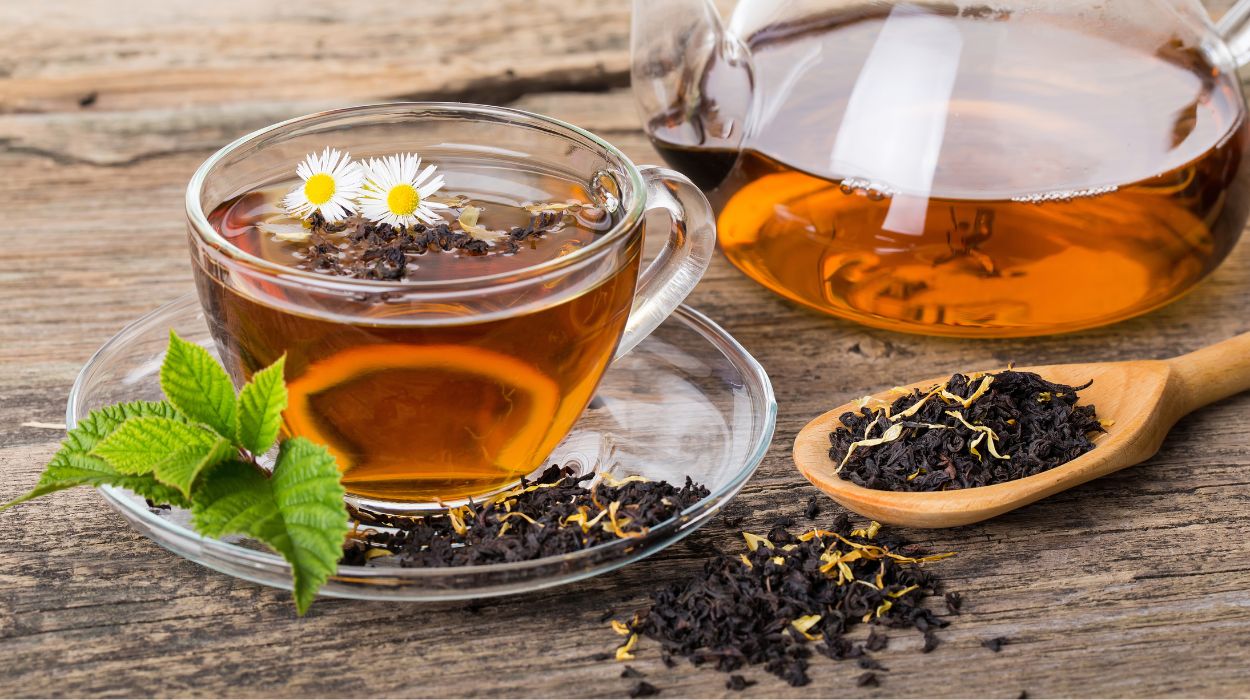 Expert's opinion
Expert's opinion
Expert's opinion
The article is a subjective view on this topic written by writers specializing in medical writing.
It may reflect on a personal journey surrounding struggles with an illness or medical condition, involve product comparisons, diet considerations, or other health-related opinions.
Although the view is entirely that of the writer, it is based on academic experiences and scientific research they have conducted; it is fact-checked by a team of degreed medical experts, and validated by sources attached to the article.
The numbers in parenthesis (1,2,3) will take you to clickable links to related scientific papers.
Best Tea For Belly Fat 2024 – Does White Tea Help You Lose Weight?

Drinking tea is helpful in weight loss. This natural beverage contains certain properties that help a great deal in trimming your belly fat. It’s also a great drink to have at any time of the day – regardless of whether or not you want to lose belly fat. In addition, these 5 fat-burning pills may also help to melt fat and promote weight loss.
It doesn’t take much to prepare yourself a cup of this special formula. Simply pour hot water into a cup with a special kind of tea leaves known as Camellia sinensis. Allow the aromatic beverage to steep for a few minutes for the flavor to infuse completely with the water.
5 Best Tea For Weight Loss In 2024
Scientists have linked drinking tea to numerous health benefits such as cell protection and lowering the chances of heart disease[1]. It’s also an effective ingredient in weight loss. However, certain types of tea are more effective than others. The following are five of the best traditional teas with many health benefits to help you melt belly fat, and achieve a lower body mass index:
- Herbal tea
- Black tea
- White tea
- Green tea
- Pu-erh tea
What Is The Best Tea For Losing Belly Fat?
Herbal Tea
Herbal teas are a fusion of hot water and fruits, spices, and herbs. They slightly differ from other types of traditional tea since they don’t contain an ounce of caffeine. They’re also not made from Camellia sinensis leaves.
The different varieties of herbal tea include hibiscus tea, rosehip tea, ginger tea, and rooibos tea. Despite the variation in formulations and ingredients, research has shown that all these herbal teas aid in fat loss and weight reduction in their ways.
Rooibos tea[2] is the most effective in terms of fat burning. An alternative study[3] was conducted on rats. The findings revealed that obese rats that drank herbal tea had normal hormone leptin levels and lower body weight.
A test-tube study[4] performed on rooibos tea revealed that it boosted fat metabolism and played a huge role in blocking the formation of fat cells. Be that as it may, further research is required to determine the effects of herbal teas on weight loss.
Black Tea

This type of tea has undergone a greater level of oxidation in comparison with other teas like white, green, or oolong tea. Oxidation[5] is the chemical reaction that occurs once tea leaves are exposed to air. The result of this process is a dark browning that serves as the characteristic color of the average black tea.
There are vast types of black tea scattered around the world. Some of the most common include English breakfast, Earl Grey, Chinese black tea, and so on. A couple of studies have been done on the effectiveness of black tea and weight loss.
A Randomized Control Trial[6] consisting of 111 individuals revealed that drinking three cups of black tea every day for at least three months reduced abdominal circumference and assisted greatly in weight loss.
White Tea
Like black and green tea, white tea is derived from the plant Camellia sinensis. There are four types of white tea: Long Life Eyebrow (Shou Mei), Tribute Eyebrow (Gong Mei), White Peony (Bai Mu Dan), and Silver Needle (Bai Hao Yinzhen).
White tea also contains notable properties that will help you shed pounds around your abdomen: it is antioxidant-rich, thereby making it an excellent option for fat absorption and burning calories. It’s also pleasant as it is refreshing, mostly due to its zero-calorie value.
Unlike black or oolong tea, white tea is partially oxidized. Test-tube studies[7] reveal that white tea boosts your body’s ability to fight skin cell inflammation resulting from free radicals.
Be careful of how much white tea you consume at any given time. Because it contains caffeine, too much of it may lead to restlessness, anxiety and even affect your sleep pattern.
Green Tea
If you drink powdered green tea at any time of the day, you’re on the right track to a flatter belly. It’s a splendid belly fat-burning tea that you want to drink every morning. There’s a good level of evidence that links green tea to weight loss.
In a Randomized Control Trial[8], 60 overweight individuals followed a strict 12-week diet while drinking either a placebo or green tea. Throughout the study, it was noted that the people who consumed green tea shed approximately 3.3kg (7.3 pounds) more than those who regularly drank a placebo.
This might be because green tea is rich in natural antioxidants known as catechins that are known to boost metabolism as well as the fat-burning process.
Pu-erh Tea
Otherwise known as pu-erh tea, pu-erh is a kind of traditional Chinese tea that has undergone intense fermentation. Think of it simply as fermented tea.
Pu-erh tea is often drunk after meals. It has an aroma that can best be described as ‘earthy’ and tends to develop based on its storage period. A couple of animal studies[9] have revealed that pu-erh tea limits blood triglycerides and can also lower blood sugar. Studies[10] in humans and animals have also revealed that this kind of tea is essential in the weight loss process.
One study[11] randomized two groups of 70 men who drank either a placebo or a capsule of pu-erh tea. Three months later, those who took the capsule shed about 1kg (2.2 pounds) more than those who sipped on a placebo. Alternative research in rats shared the findings, thereby revealing that pu-erh tea extract helps in suppressing weight gain and has an anti-obesity effect.
Final Thoughts
Aside from herbal teas, all tea leaves are a product of the same plant, Camellia sinensis. Therefore, drinking any of these teas will give you a similar effect with the same benefits, but some are more effective than others. To boost your weight loss efforts, we recommend that you back your tea consumption with a weight loss diet and a regular exercise regimen.
Make it a priority to work out for at least 30 minutes every day of the week. Quit the soda and drink more tea. Eat nutrient-rich, low-calorie foods like whole grains, protein, garlic, and fruits as you strive to achieve that much-desired reduced waist circumference.
+ 11 sources
Health Canal avoids using tertiary references. We have strict sourcing guidelines and rely on peer-reviewed studies, academic researches from medical associations and institutions. To ensure the accuracy of articles in Health Canal, you can read more about the editorial process here
- Kuriyama, S. (2008). The Relation between Green Tea Consumption and Cardiovascular Disease as Evidenced by Epidemiological Studies. The Journal of Nutrition, [online] 138(8), pp.1548S1553S. Available at: https://pubmed.ncbi.nlm.nih.gov/18641205/.
- Hong, I.-S., Lee, H.-Y. and Kim, H.-P. (2014). Anti-Oxidative Effects of Rooibos Tea (Aspalathus linearis) on Immobilization-Induced Oxidative Stress in Rat Brain. PLoS ONE, [online] 9(1), p.e87061. Available at: https://www.ncbi.nlm.nih.gov/pmc/articles/PMC3897768/.
- Sun, F. and Yu, J. (2000). The Effect of a Special Herbal Tea on Obesity and Anovulation in Androgen-Sterilized Rats. Proceedings of the Society for Experimental Biology and Medicine, [online] 223(3), pp.295–301. Available at: https://pubmed.ncbi.nlm.nih.gov/10719843/.
- Sanderson, M., Mazibuko, S.E., Joubert, E., de Beer, D., Johnson, R., Pheiffer, C., Louw, J. and Muller, C.J.F. (2014). Effects of fermented rooibos (Aspalathus linearis) on adipocyte differentiation. Phytomedicine, [online] 21(2), pp.109–117. Available at: https://pubmed.ncbi.nlm.nih.gov/24060217/.
- Roberts, E.A.H. and Wood, D.J. (1950). The fermentation process in tea manufacture. 11. Oxidation of substrates by tea oxidase. Biochemical Journal, [online] 47(2), pp.175–186. Available at: https://www.ncbi.nlm.nih.gov/pmc/articles/PMC1275185/.
- Bøhn, S.K., Croft, K.D., Burrows, S., Puddey, I.B., Mulder, T.P.J., Fuchs, D., Woodman, R.J. and Hodgson, J.M. (2014). Effects of black tea on body composition and metabolic outcomes related to cardiovascular disease risk: a randomized controlled trial. Food Funct., [online] 5(7), pp.1613–1620. Available at: https://pubmed.ncbi.nlm.nih.gov/24889137/.
- Dias, T.R., Gonçalo David Tomás, Teixeira, N.F. and Branca Maria Silva (2013). White Tea (Camellia Sinensis (L.)): Antioxidant Properties And Beneficial Health Effects. [online] ResearchGate. Available at: https://www.researchgate.net/publication/235995355_White_Tea_Camellia_Sinensis_L_Antioxidant_Properties_And_Beneficial_Health_Effects.
- Auvichayapat, P., Prapochanung, M., Tunkamnerdthai, O., Sripanidkulchai, B., Auvichayapat, N., Thinkhamrop, B., Kunhasura, S., Wongpratoom, S., Sinawat, S. and Hongprapas, P. (2008). Effectiveness of green tea on weight reduction in obese Thais: A randomized, controlled trial. Physiology & Behavior, [online] 93(3), pp.486–491. Available at: https://pubmed.ncbi.nlm.nih.gov/18006026/.
- Kuo, K.-L., Weng, M.-S., Chiang, C.-T., Tsai, Y.-J., Lin-Shiau, S.-Y. and Lin, J.-K. (2004). Comparative Studies on the Hypolipidemic and Growth Suppressive Effects of Oolong, Black, Pu-erh, and Green Tea Leaves in Rats. Journal of Agricultural and Food Chemistry, [online] 53(2), pp.480–489. Available at: https://pubmed.ncbi.nlm.nih.gov/15656692/.
- Deng, Y.-T., Lin-Shiau, S.-Y., Shyur, L.-F. and Lin, J.-K. (2015). Pu-erh tea polysaccharides decrease blood sugar by inhibition of α-glucosidase activity in vitro and in mice. Food & Function, [online] 6(5), pp.1539–1546. Available at: https://pubmed.ncbi.nlm.nih.gov/25820466/.
- Yang, T.-Y., Chou, J.I., Ueng, K.-C., Chou, M.-Y., Yang, J.-J., Lin-Shiau, S.-Y., Hu, M.-E. and Lin, J.-K. (2014). Weight Reduction Effect of Puerh Tea in Male Patients with Metabolic Syndrome. Phytotherapy Research, [online] 28(7), pp.1096–1101. Available at: https://pubmed.ncbi.nlm.nih.gov/24399768/.



